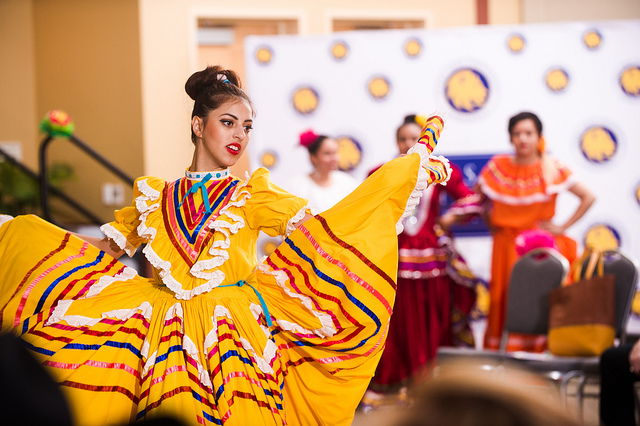Every year, Hispanic Heritage Month is observed here in the United States. It is September 15th through October 15th. Throughout this month, the culture, history, and contributions of Hispanics in the United States is celebrated. Whether it is the history of people from Spain, Mexico, Central & South America, or the Caribbean. So, how did Hispanic Heritage Month come to be?
It began in 1968, when there was a Hispanic Heritage Week. Although it started under the Presidency of Lyndon Johnson, it expanded under President Ronald Reagan in 1988. According to the Government Printing Office, it became a law (Public Law 100-402) in August of 1988. This month is celebrated in many different ways.

Celebrating Hispanic Heritage Month. Photo courtesy of Texas A&M University-Commerce Marketing Communications Photography.
Nationally, the Library of Congress has events, exhibitions, and stories. Among the events, a book talk by Carmen Boullosa, who is a Mexican poet, novelist, and playwright. Others who are being honored are author Cindy Trumbore and illustrator Susan L. Roth of “Parrots over Puerto Rico.” They will be awarded the 2014 Américas Awards for Children’s and Young Adult Literature. For more information, be sure to visit the Official Page of Hispanic Heritage Month.
Locally, UIUC has a couple of events going on around campus and the community. Among them are:
CLACS (The Center for Latin American and Caribbean Studies) has organized the 2014 Latin American Film Festival. This Festival began on September 19th and will go all the way through September 25th. Seven films will be showing. The countries and cultures from these films are diverse and showcase that while the countries may be in Latin America, each one has their own unique language/dialect and culture. For the movies and showings, check out the schedule.
There is also a Lecture Series that provides talks and lectures on many different subjects and interests related to Latin America and the Caribbean. Topics such as, “Big Business as Usual: the 2014 World Cup.” For more information, be sure to check out the full schedule.
For more events, La Casa Cultural Latina has a whole schedule for the month. La Casa was part of the Office of Inclusion and Intercultural Relations’ (OIIR) initiative to the “recruiting and retaining underrepresented students, diversity education, civic engagement, and fostering the leadership skills necessary to develop global citizens.”
Just because Hispanic Heritage Month is just that, for a month, it doesn’t mean that it stops there. The University and Library offer many resources for students of Latino descent, or for those who would like to learn more about Hispanic Culture and/or language. Lucky for you, we compiled a list for you.
UIUC Mi Pueblo: This a Spanish-conversation group. They meet at different parts of campus for 1-hour sessions led by UIUC students. For more information about the sessions. Check out their website.
La Casa Cultural: Founded at UIUC in 1974, La Casa Cultural Latina has been committed to Latino/a students on campus, as well as the community [.
Browse through the Registered Student Organizations (RSO) and pick which ones would be the best for you. For a complete list of RSO’s, browse a whole list of them.
Don’t forget that your library also has some great resources. Did you know that the International and Area Studies Library has a collection of Latin American books? Not only books, but newspapers and journals as well, so that you can keep up with the news. A lot of them in Spanish!
The Undergraduate Library also has a media collection with many movies and documentaries in Spanish and Portuguese, ranging from many different countries in Latin America. Some examples include, “Diarios de Motocicleta” (The Motorcycle Diaries), “Maria Full of Grace“, and “El Norte” (The North), just to name a few.
The Undergraduate Library’s QB (Question Board), has received questions from students since 1989. There have been many different questions throughout that time. Among them:
The above are just a few of the different types of questions that QB receives. To browse, search, or even submit your own question, visit QB!
For more resources that the library has to offer, browse through the subject guide offered.
There are so many things, that even we can’t list all at once in this blog post. We hope that you have found some new activities to take part in and new resources around the library.



